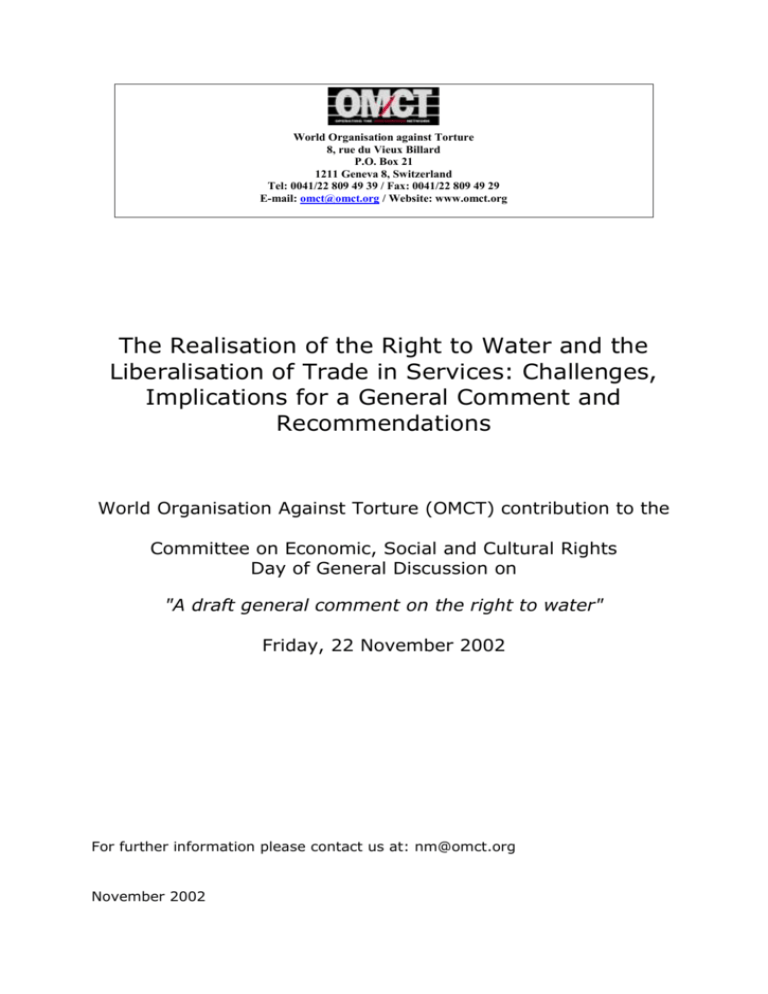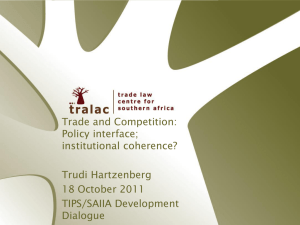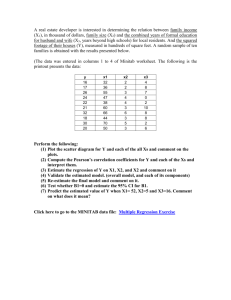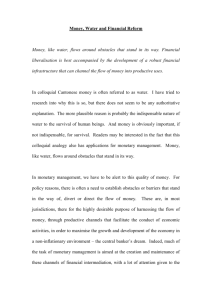escrwaternov2002
advertisement

World Organisation against Torture 8, rue du Vieux Billard P.O. Box 21 1211 Geneva 8, Switzerland Tel: 0041/22 809 49 39 / Fax: 0041/22 809 49 29 E-mail: omct@omct.org / Website: www.omct.org The Realisation of the Right to Water and the Liberalisation of Trade in Services: Challenges, Implications for a General Comment and Recommendations World Organisation Against Torture (OMCT) contribution to the Committee on Economic, Social and Cultural Rights Day of General Discussion on "A draft general comment on the right to water" Friday, 22 November 2002 For further information please contact us at: nm@omct.org November 2002 CONTENT Part One ................................................................................................................................. 3 I. The Right to Water, Privatisation and Liberalisation of Trade in Services .................................................................................................................................. 3 1. A Human Rights Framework for the Privatisation of Water Services and its Implementation in the Context of Liberalisation of Trade in Services .................................. 3 2. The Normative Content of the Right to Water and the Implicit Recognition of the Concept of Affirmative Action .............................................................................................. 4 3. The Human Rights to Water and Water as a Trading Good: Implications for Affirmative Action Policies ................................................................................................... 6 4. The General Agreement on Trade in Services (GATS) and the realisation of the Right to Water .................................................................................................................................. 7 Part Two ................................................................................................................................ 8 II. 1. 2. Implications for the General Comment ..................................................... 8 The Obligation to Respect, Protect and Fulfil ................................................................ 9 Obligations of Actors other than States.......................................................................... 9 Three............................................................................................................................ 10 Part III. Recommendations .............................................................................................. 10 2 I. Part One The Right to Water, Privatisation and Liberalisation of Trade in Services 1. A Human Rights Framework for the Privatisation of Water Services and its Implementation in the Context of Liberalisation of Trade in Services The provision of basic services constitutes an essential element towards the realisation of human rights, including the right to water.1 International human rights law does not specify that the provision of basic services shall be and remain a governmental prerogative. For instance, within the framework of the Convention on the Rights of the Child (CRC), the right of children belonging to minorities or indigenous peoples to enjoy their own culture and to use their own language might recognise that basic services such as education, can be provided on a private basis.2 In this respect, the Council of Europe’s Framework Convention for the Protection of National Minorities leaves no doubt that persons belonging to national minorities have a right to set up and to manage their own private educational and training establishments.3 However, while letting the modalities of basic services’ provision open with respect to the involvement of the private sector, international human rights law puts precise conditions and benchmarks upon the manner through which basic services should be delivered, along with the final aim of services’ delivery. Accordingly, the Committee on Economic, Social and Cultural Rights (hereafter the Committee) has defined essential principles concerning the delivery of basic services, in order to guarantee the equitable, non-discriminatory and universal enjoyment of the rights enshrined in the International Covenant on Economic, Social and Cultural Rights (ICESCR). Consequently, State parties to the ICESCR have the obligation to guarantee that the privatisation of basic services is being formulated in accordance with human rights and guarantees the principles of accessibility, acceptability, non-retrogression, transparency and participation. 4 In this regard, the principle of accessibility entails the dimensions of non- 1 Committee on Economic, Social and Cultural Rights, General Comment No. 14, para 43 (c); UN Doc. E/CN.4/2002/59, Report of the Special Rapporteur on adequate housing as a component of the right to an adequate standard of living, March 2002, paras 49-68; See also the work of the Expert of Sub-Commission for the Promotion and Protection of Human Rights, Mr. Guissé, on the right to safe-drinking water. 2 See article 30 of the Convention on the Rights of the Child and article 27 of the International Covenant on Civil and Political Rights 3 See article 13(1) of the Framework Convention for the Protection of National Minorities 4 Committee on Economic, Social and Cultural Rights, General Comment No. 12; General Comment No. 13; General Comment No. 14, in UN Doc. HRI/GEN/1/Rev.4, 7 February 2000; Committee on Economic, Social and Cultural Rights, Poverty and the International Covenant on Economic, Social and Cultural Rights, UN Doc. E/C.12/2001/10, 10 May 2001 10/05/2001, paras 9-13 3 discrimination, physical accessibility and economic accessibility (affordability), while the notion of acceptability stresses upon the quality of the basic services.5 The draft General Comment on the right to water recognises, in this respect, that State parties to the ICESCR, under the principle of due diligence, have the obligation to guarantee that third parties operating or controlling water services and resources do not impair, among others, the accessibility and affordability of the right to water (para 18). In this respect, OMCT welcomes the wording of the draft General Comment stipulating that privatisation of water services requires an effective regulatory system, be in conformity with the ICESCR, includes and independent monitoring, be participatory and imposes penalties for noncompliance. This human rights framework providing for the privatisation of water services is part of States’ obligations to prevent third parties from interfering in any way with the enjoyment of the right to water (see para 18 of the draft General Comment on the right to water). However, the question arises as to whether State parties to the ICESCR will have the ability to implement similar regulation and exercise the principle of due diligence in the context of liberalisation of trade in water services, as provided for in binding regional and international trade agreements.6 The following parts, using the principle of affirmative action as an example, examine the possible limits put on States’ obligations to respect, protect and fulfil the right to water by regional and international trade agreements on the liberalisation of trade in services. 2. The Normative Content of the Right to Water and the Implicit Recognition of the Concept of Affirmative Action In its General Comments on the right to adequate housing (No. 4), the right to adequate food (No. 12), the right to education (No. 13) and the right to health (No. 14), the Committee underlined that the normative content of these rights encompasses, among others, the essential feature of economic and physical accessibility.7 The draft General Comment on the right to water does not make an exception and stresses the elements of affordability and accessibility (para 8). These two normative elements of the right to water entail general and specific legal obligations from State parties to the ICESCR. These obligations include, among others, the prohibition to take any retrogressive measures with respect to the realisation of the right to water, the obligation to exercise due diligence, to take steps to remove de facto discrimination and to give special attention to those individuals and groups who have traditionally faced difficulties in exercising this right (see paras 10, 12, 13 of the draft General Comment on the right to water). In this regard, the draft General Comment lists, among others, women, rural areas, deprived urban areas and indigenous peoples (para 13). 5 Ibid. UN Doc. E/CN.4/SUB.2/RES/2001/4, Liberalization of trade in services and human rights 7 Committee on Economic, Social and Cultural Rights, General Comment No. 4, para 7; General Comment No. 12, para 12; General Comment No. 13, para 6; General Comment No. 14, para 12, in UN Doc. HRI/GEN/1/Rev.4, 7 February 2000 6 4 OMCT believes that the removal of de facto discrimination, along with the necessity to give special attention to individuals and groups traditionally facing difficulties in exercising the right to water implicitly recognises the concept of affirmative action policies or special measures. This recognition is in line with the Committee’s approach regarding the elimination of de facto discrimination, as well as effective enjoyment of the rights enshrined in the ICESCR. Indeed, the Committee, in its first General Comment, stated that an initial step towards the realisation of the ICESCR’s rights is to identify and give special attention to the vulnerable or disadvantaged regions areas, groups and subgroups.8 Moreover, in its General Comment No. 13, the Committee stressed that “the adoption of temporary special measures intended to bring out de facto equality for men and women and for disadvantaged groups is not a violation of the right to non-discrimination with regard to the right to education, so long as such measures do not lead to the maintenance of unequal or separate standards for different groups, and provided that they are not continued after the objectives for which they were taken have been achieved”.9 Indeed, the overall aim of affirmative action policies is to bring out de facto and effective equality in the enjoyment of all human rights. In its General Comment on article 26 of the International Covenant on Civil and Political Rights (ICCPR), which is a general nondiscrimination provision, the Human Rights Committee stressed that “the principle of equality sometimes requires States parties to take affirmative action in order to diminish or eliminate conditions which cause or help to perpetuate discrimination (…)”.10 The UNESCO Declaration on Race and Racial Prejudice of 1978, adopted by unanimity and considered to have become part of international human rights law,11 stresses in its article 9 that particular attention should be paid to racial or ethnic groups which are socially or economically disadvantaged, so as to afford them, on a completely equal footing and without discrimination the advantages of social measures in force, in particular with regard to housing, employment, health and education.12 As such, the concept of affirmative action is understood as “a coherent packet of measures, of a temporary character, aimed specifically at correcting the position of members of a target group in one or more aspects of their social life, in order to obtain effective equality”. 13 Policies of affirmative action can be carried out by actors belonging to the public sector or to the private one and have targeted women, blacks, immigrants, poor people, disabled persons, veterans, indigenous people, other racial groups, specific minorities, etc.14 Programmes for disadvantaged areas, in order to balance internal inequalities of economic and political power, have also been implemented as affirmative actions measures.15 8 Committee on Economic, Social and Cultural Rights, General Comment No. 1, para 3, in UN Doc. HRI/GEN/1/Rev.4, 7 February 2000 9 Committee on Economic, Social and Cultural Rights, General Comment No. 13, para 32, in UN Doc. HRI/GEN/1/Rev.4, 7 February 2000 10 Human Rights Committee, General Comment No. 18, para 10, in UN Doc. HRI/GEN/1/Rev.4, 7 February 2000 11 U.N. Doc. E/CN.4/Sub.2/2000/11, June 2000 12 Ibid. 13 U.N. Doc. E/CN.4/Sub.2/2001/15, June 2001, para 7 14 Ibid, paras 8, 12 15 Ibid., para 35 5 3. The Human Rights to Water and Water as a Trading Good: Implications for Affirmative Action Policies Affirmative action policies can cover a whole ranges of measures from the establishment of quotas, the granting of subsidies, the implementation of training programmes for specific groups, etc. The limits put on affirmative action measures by international human rights law are that these measures shall not lead to discrimination and that they must be temporary in nature.16 While these limits are clearly defined, the non-discrimination principle, as it is understood under international trade law, might well put additional constraints on State parties’ ability to implement affirmative action policies aimed at guaranteeing de facto and effective equality in the enjoyment of the right to water. Indeed, while the human right to water is being currently examined by the Committee, it is, at the same time, considered as a trading good under the General Agreement on Trade in Services (GATS) of the World Trade Organisation (WTO).17 This concurrent approach imposes different requirement upon States, where their non-discrimination obligations under international human rights law might well clash with their non-discrimination commitments under international trade law. Indeed, the realisation of the non-discrimination principle under international human rights law might require, in certain instances, to give preferential treatment to certain groups or regions in order to guarantee a de facto and equal enjoyment of economic, social and cultural rights, including the right to water. As the provision of basic services is crucial for the enjoyment of economic, social and cultural rights, this preferential treatment to certain groups or regions might well have some repercussion on the treatment given to service suppliers and corporations operating in the water sector, notably in term of regulatory measures and subsidies. In this respect, the High Commissioner for Human Rights encourages, in her report on the ‘Liberalisation of Trade in Services and Human Rights’, that States take action to ensure universal supply of essential services, including water, notably through the use of affirmative action to guarantee provision of essential services to the poor, isolated and marginalized.18 In fact, in certain circumstances, State parties to the ICESCR might well consider that the implementation of affirmative action policies represent the sole way to guarantee de facto and effective enjoyment of the right to water for certain regions or communities. One can therefore imagine that in order to guarantee that the population of a given rural area enjoy the right to water on an equal basis with the rest of the country, a State party to the ICESCR will have to subsidise a given water supplier. Whereas such treatment does not raise any concern under international human rights law (if it does not lead to discrimination and is temporary in nature), it might well constitute a problem under international trade law. In other words, the implementation of affirmative action 16 Ibid., para 41 Article I.3. of the GATS 18 Report of the High Commissioner, Liberalisation of Trade in Services and Human Rights, UN Doc. E/CN.4/Sub.2/2002/9, para 69 17 6 policies within the framework of the realisation of the right to water might well imply that differential treatment –in term of regulatory measures or subsidies- is given to corporations or service suppliers operating in the water sector. In the light of these concurrent requirements of non-discrimination, the question arises as to the real margin of manoeuvre left by regional and international agreements providing for the liberalisation of trade in services with respect to the implementation of special measures aiming at guaranteeing the effective and equal enjoyment of the right to water, including under the principle of due diligence. 4. The General Agreement on Trade in Services (GATS) and the realisation of the Right to Water The GATS provides a legal framework for the progressive liberalisation of trade in services, including services related to the treatment and delivery of water. As other WTO agreements, the GATS entails different requirements, including the ‘most favoured nation’ and the ‘national treatment’ principles. The concurrent application of both principles requires equality of treatment between foreign service and national service suppliers, as well as nondiscrimination between national and non-national services and service suppliers. Under the GATS, non-compliance with these requirements renders WTO members subjected to the enforceable WTO dispute settlement system. In this respect, concerns arise regarding the margin of manoeuvre left to State parties to the ICESCR for implementing adequate policies that are aimed at guaranteeing that all the sectors of the population -including those groups or regions who have traditionally faced difficulties in exercising the right to water- effectively enjoy the right to water.19 In her report on the ‘Liberalisation of Trade in Services and Human Rights’, the High Commissioner for Human Rights noted that while the principles of non-discrimination exists both under human rights law and trade law, their meaning remains different and the implementation of this principle under trade law might well prevent that the same principle is being realised under human rights law.20 Indeed, as mentioned in the High Commissioner report, non-discrimination in trade law envisages equal treatment for all service providers. Under the GATS, and assuming that a government made a commitment in the water sector,21 the principle of non-discrimination (national treatment and most favoured nation) might well prevent this government from subsidising a given service provider –public or private- in order to guarantee the equal enjoyment of the right to water for vulnerable groups or communities or to remove de facto discrimination thereof. 19 See in this regard the 2001 and 2001 resolutions of the UN Sub-Commission for the Promotion and Protection of Human Rights 20 Report of the High Commissioner, Liberalisation of Trade in Services and Human Rights, UN Doc. E/CN.4/Sub.2/2002/9, paras 59-62 21 Under the GATS, WTO members have to make commitments with respect to the opening of their services and ongoing negotiations are being carried out in this respect. Consequently, WTO members have no obligations, under the GATS, to liberalise their water sector. 7 Whereas the GATS provides some guidance about States’ possibility to implement policies discriminating between the suppliers of a given service, the wording either appears in the preambular part of the agreement or remains ambiguous and unclear. Indeed, the GATS recognizes the right of Members to regulate in the public interest.22 However, the fact that this recognition appears in the preamble and is subjected to the rule that services regulations do not constitute unnecessary barriers to trade and are administrated in a reasonable, objective and impartial manner raise serious concerns as to whether the nondiscrimination principles under trade law will not clash with States’ obligations under international human rights law. Moreover, article XV of the GATS recognises the role of subsidies in relation to development programmes in developing countries and the need for flexibility in this area, but also stresses their trade-distortive effect.23 Overall, the GATS does not seem to prohibit the granting of subsidies, as long as they are given on a non-discriminatory manner.24 However, further negotiations are meant to address the issue.25 In the light of the GATS’ ambiguity with respect to the margin of manoeuvre that is left for the implementation of adequate regulatory measures necessary for the equal and universal realisation of the right to water, State might well find themselves in a position where they will have to choose between fulfilling their human rights obligations or facing trade sanctions under the enforceable WTO dispute settlement system. One can see, therefore, that in the context of liberalisation of trade in services, as provided for under the GATS, the human rights framework applying to the privatisation of the water sector (as highlighted in para 18 of the draft General Comment on the right to water) might be difficult to apply in its integrity. II. Part Two Implications for the General Comment While the relationship between human rights and the GATS is not the focus or the purpose of a General Comment on the right to water, this issue remains central as it is likely to have an influence on the enjoyment of the right to water, notably with respect to its normative components of affordability and accessibility, as well as with regard to the State parties to the ICESCR’s ability to implement special measures and exercise due diligence in order to abide by their concurrent obligations to respect, to protect and to fulfil the right to water. In this respect, OMCT believes that it is crucial that a General Comment addresses this question, notably with respect to State parties’ obligations at the national level and the obligation of actors other than States.26 22 Preamble of the GATS Article XV 24 See the principles of the Most Favoured Nation (article II) and national treatment (article XVII) 25 Supra note 23 26 In the current draft, State parties obligations are being dealt with in paras 9-21 ; the obligations of actors other than States are being covered by para 43. 23 8 1. The Obligation to Respect, Protect and Fulfil As mentioned in the draft General Comment, the obligation to respect, to protect and to fulfil notably requires State parties to the ICESCR to refrain from engaging in any practice or activity that denies or limits equal access to the right to water (para 16), to prevent third parties from interfering in any way in the enjoyment of the right to water (para 17) and to adopt the necessary measures directed towards the full realisation of the right to water (para 19). In addition to these specific legal obligations, State parties also bear obligations of a general nature, which include the prohibition of retrogressive measures and the exercise of due diligence. While OMCT believes that these obligations clearly cover the legislative, administrative and other measures that State parties have to undertake at the national level, they also circumscribe the commitments made by State parties in international and regional trade forum. In this respect, numerous concluding observations issued by the Committee stipulate that State parties shall bring their obligations under the ICESCR in their negotiations with International Financial Institutions (IFIs) and the WTO.27 Applied to the liberalisation of trade in services’ framework, OMCT believes that these obligations require, in conjunction with the principle of good faith, that State parties shall undertake prior assessments before they open their water sector under the GATS or under any other regional agreement providing for the liberalisation of trade in services. These assessment shall thoroughly review the potential human rights impact of liberalisation of trade in services related to the provision of water, taking into account the need to adopt the necessary measures directed towards the full realisation of the right to water. Moreover, these human rights assessments shall be public, independent, participatory, inclusive and transparent. Human rights assessments shall also be conducted, on an ongoing basis, when commitments have been made to open the water sector to liberalisation of trade in services. In this respect, the High Commissioner for Human Rights, in her report on the ‘Liberalisation of Trade in Services and Human Rights’, stresses that where assessments indicate negative effects of past liberalisation policies on the enjoyment of human rights, WTO members shall allow the maximum flexibility to withdraw liberalisation commitments. 28 This questions brings us to the obligations of actors other than States with respect to the right to water. 2. Obligations of Actors other than States As it stands, the draft General Comment on the right to water recognises, in its paragraph 43, the obligations of actors other than states. In this respect, special reference is being made to international financial institutions, stressing that they should take into account the right to 27 See for instance UN Doc. E/C.12/Add.71, Concluding Observations of the Committee on Economic, Social and Cultural Rights : Algeria.30/11/2002,para 43; UN Doc. E/C.12/1/Add.66, Concluding Observations of the Committee on Economic, Social and Cultural Rights :Nepal. 24/09/2001, para 38 28 Report of the High Commissioner, Liberalisation of Trade in Services and Human Rights, UN Doc. E/CN.4/Sub.2/2002/9, para 72 9 water in their lending policies, credit agreements, structural adjustment programmes and other development projects. In the same line, OMCT considers that the right to water should be fully taken into account in the negotiations, definition, undertakings, interpretation and implementation of trade policies related to the liberalisation of trade in services, including under the GATS. In this respect the High Commissioner for Human Rights, in her report on the ‘Liberalisation of Trade in Services and Human Rights’, stresses that the government’s right and duty to regulate shall be guaranteed, that the GATS’ interpretation shall be compatible with human rights and that the promotion and protection of human rights shall be taken into account in the process of liberalisation of trade in services.29 Part Three III. Recommendations In light of these remarks, and of the above-mentioned developments, OMCT recommends to the Committee on Economic, Social and Cultural Rights to address in its General Comment on the right to water the question of the liberalisation of trade in services in order to clarify States’ obligations and obligations of other actors in this respect. In this regard, OMCT would propose the following wording for the current draft General Comment on the right to water. With respect to paragraph 18, OMCT would add the following wording at the end of the paragraph: Within the framework of liberalisation of trade in services, including under the General Agreement on Trade in Services (GATS), State parties should make commitments as to the liberalisation of the water sector on the basis of sound empirical evidence. To this end, State parties shall undertake public, independent, participatory, inclusive and transparent human rights assessments of the impact of liberalisation policies –past policies and future options- on the enjoyment of the right to water before making any commitment in this respect. Regarding paragraph 43, OMCT would propose the following adding, to preceded the last sentence of the paragraph: The regional and international trade agreements, including the WTO, shall take into account the right to water in their definition, negotiations, interpretation, implementation and dispute resolution, notably in the realm of liberalisation of trade in services. 29 Report of the High Commissioner, Liberalisation of Trade in Services and Human Rights, UN Doc. E/CN.4/Sub.2/2002/9, paras 70-71 10





